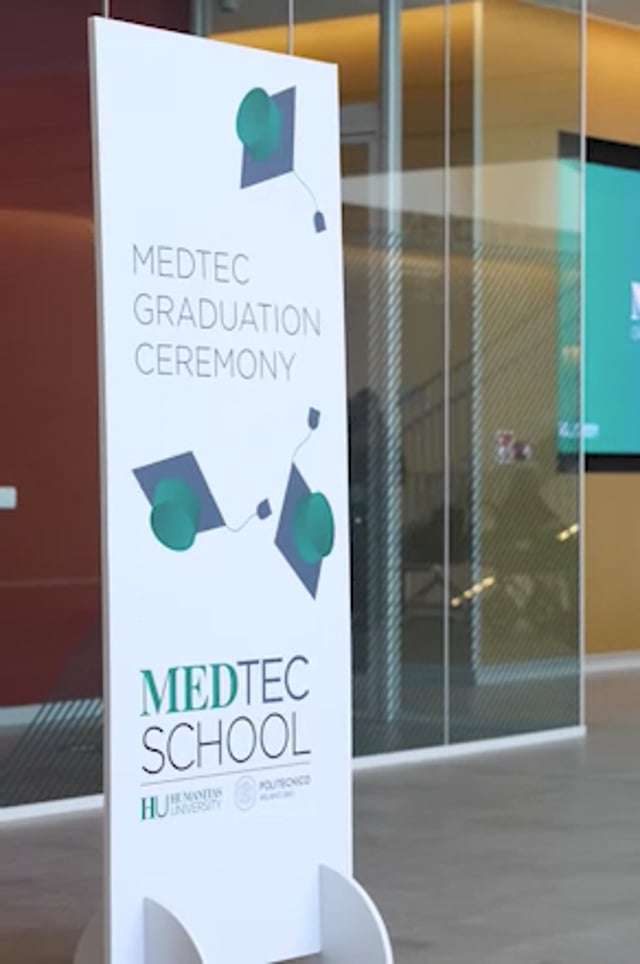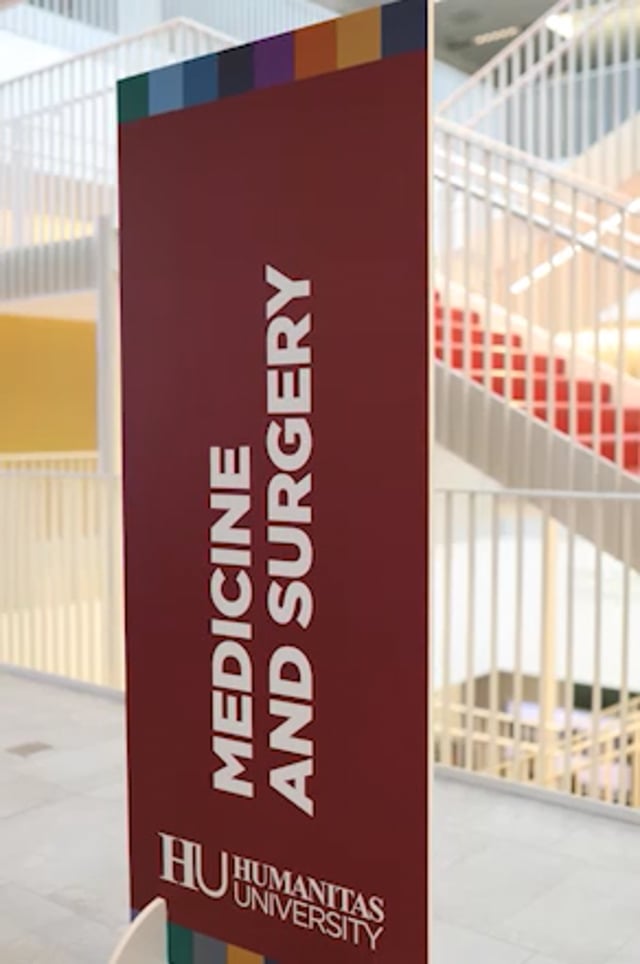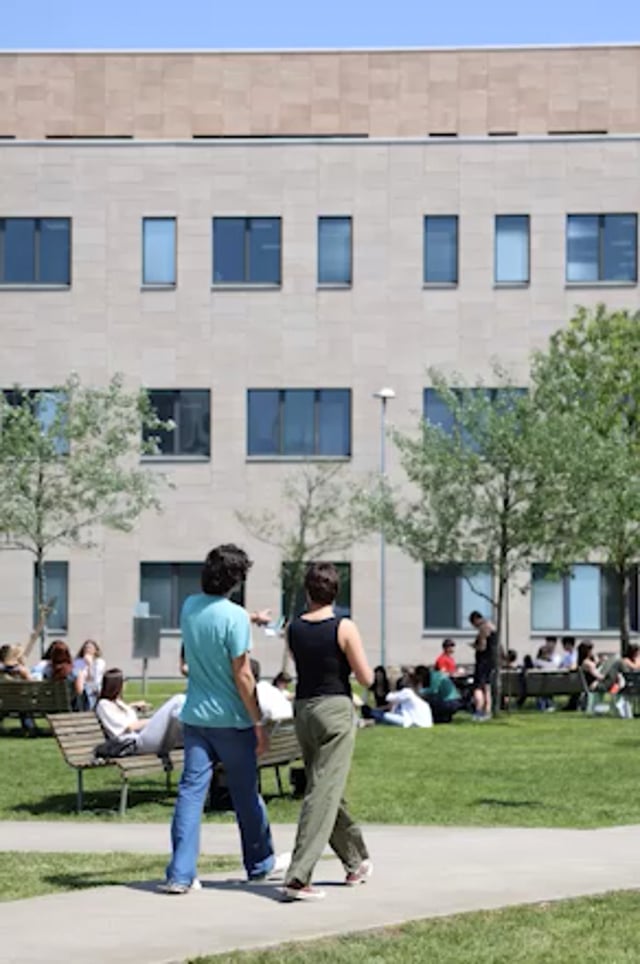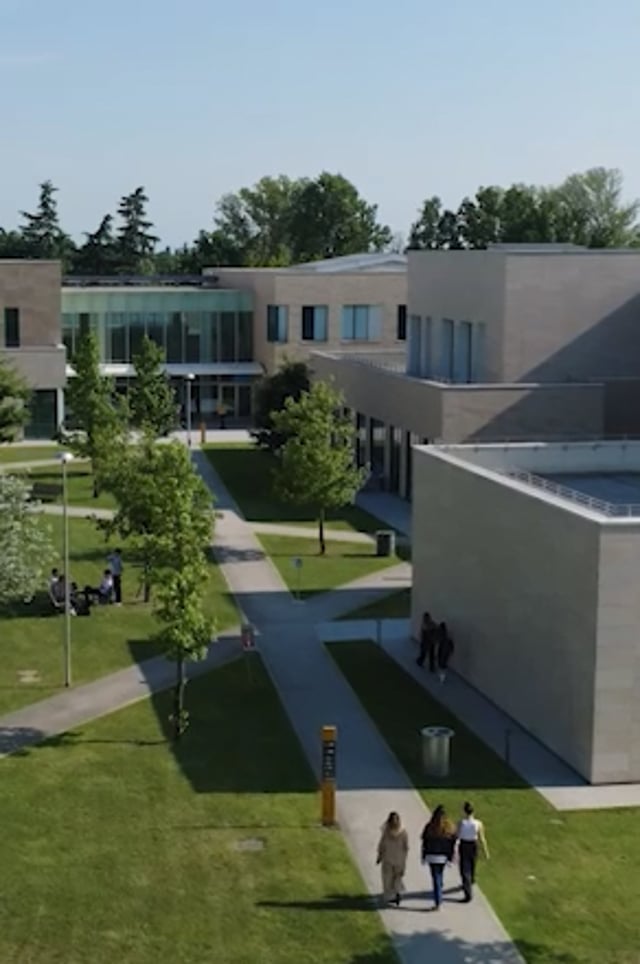The PhD Programme in Molecular, Experimental and Computational Medicine (MECM), developed by Humanitas University in collaboration with IRCCS Istituto Clinico Humanitas, offers advanced interdisciplinary training in molecular medicine, translational research, and data science.
Combining theoretical education with hands-on experience, the programme prepares students to tackle biomedical challenges through innovation, precision medicine, and the integration of research and clinical practice.
Programme Overview
The PhD program, developed in collaboration with IRCCS Humanitas, offers top-tier interdisciplinary training across various fields of life sciences and molecular medicine. It combines theoretical knowledge and practical experience in a highly stimulating environment. Students have access to cutting-edge technologies and real clinical cases, with the goal of deepening their understanding of the molecular mechanisms underlying diseases, developing innovative diagnostic and therapeutic strategies, and promoting translational research and the practical application of acquired knowledge.
The program includes specific training in biomedical technologies for big data analysis, with a focus on omics techniques (genomics, epigenomics, transcriptomics, proteomics, metabolomics, lipidomics, radiomics), systems biology approaches, imaging and flow cytometry methods, and the analysis of data from electronic health records. These tools equip students with key competencies for integrated analysis of complex datasets, which are essential to address the challenges of modern medicine.
The program’s approach is designed to provide advanced and comprehensive education in experimental and computational medicine, preparing PhD students to become leaders in biomedical research, capable of tackling pressing healthcare challenges through scientific innovation and precision medicine.
The PhD program is conducted in a highly stimulating environment that fosters interaction among different scientific disciplines and encourages international collaboration. Students have the opportunity to engage with world-renowned experts and researchers, participate in multidisciplinary projects, and develop strong scientific independence. The emphasis on hands-on experience, combined with ongoing research innovation, allows students to acquire essential skills to face the challenges of a constantly evolving scientific landscape.
Three different curricula are available, candidates are required to specify their curriculum preferences when applying:
1. MECM Standard
The experimental PhD track is designed to train highly qualified researchers in biological sciences and medicine, with a strong focus on understanding the molecular mechanisms underlying diseases and developing innovative therapeutic strategies. This curriculum adopts a multidisciplinary approach, integrating genetics, biochemistry, and pharmacology, and leverages cutting-edge technologies such as genomics, proteomics, metabolomics, systems biology, and molecular imaging. Doctoral candidates will work in state-of-the-art laboratories, where they will develop experimental skills with a particular emphasis on translational research, aiming to accelerate the application of scientific discoveries to diagnosis and treatment. Students are immersed in a highly stimulating environment that promotes both research autonomy and collaboration with fellow researchers and healthcare professionals, applying theoretical knowledge to real experimental and clinical contexts.
2. MECM Clinical
The MECM-Clinical track is designed to integrate experimental research (such as cellular and molecular biology, informatics, and the use of preclinical models for translational studies) with direct clinical practice, including patient enrollment and evaluation in dedicated studies. The program combines hands-on hospital experience under the supervision of a physician with at least 24 hours per week of experimental research in the laboratory. PhD candidates will be directly responsible for managing research projects approved by their clinical and/or laboratory supervisors. This interdisciplinary approach enables students to develop advanced skills in both scientific research and clinical practice, with the goal of rapidly translating discoveries into diagnostic and therapeutic innovations.
3. MECM Data Science
The Data Science track is designed to synergistically integrate experimental research—both basic and clinical—with the advanced competencies of a data scientist. Its main objective is to provide students with comprehensive training in the analysis and interpretation of data from multiple sources, including omics technologies, imaging, and flow cytometry. PhD candidates will develop cross-disciplinary skills ranging from statistics to bioinformatics, mastering advanced techniques for the analysis of large and complex datasets. They will gain experience in the use of bioinformatics tools and software, statistical methods for data processing, predictive and diagnostic modeling, and algorithm development for data management and interpretation. This training path prepares graduates to become experts in handling complex data, with direct impact on research, the development of novel diagnostic and therapeutic tools, and the implementation of advanced clinical applications.
PhD Coordinator: Prof. Michela Matteoli

Places available
8 places
The number of available places and/or scholarships may increase in the event that external funding becomes available by the deadline set for the completion of the call application procedure.
Language
English
Duration
3 years
Beginning of teaching activities
1st December 2025
Application deadline
17th July 2025
Contacts
For further information you can contact phd@hunimed.eu
Program Objectives
The main goal of the PhD program in MECM – Molecular, Experimental and Computational Medicine is to provide a solid foundational, methodological, and experimental training to researchers and medical professionals, preparing them to face scientific and clinical challenges in the complex and innovative fields of molecular medicine.
Training is offered in cross-cutting and multidisciplinary research areas, including oncology, immunology, cardiovascular, neurodegenerative, and metabolic diseases, with a particular focus on advanced techniques in cell and molecular analysis, as well as personalized medicine.
The program is structured into three distinct tracks (standard, clinical, and Data Science), designed to strengthen the connections and interdependence between basic science and applied disciplines. This integrated approach promotes a fast and continuous flow of knowledge transfer from basic research to clinical practice, accelerating the adoption of scientific innovations. In doing so, the program contributes to the development of cutting-edge diagnostic and therapeutic applications in medicine, with a tangible and direct impact on patient health and clinical practices.
Through this integrated and multidisciplinary model, the MECM PhD program aims to train highly specialized professionals capable of making significant contributions to the advancement of molecular and experimental medicine, with a direct impact on clinical practice and biomedical research on a global scale.
Career Opportunities
Graduates of the three-year PhD program are equipped for a wide range of career paths, aligned with the program’s educational goals. Thanks to the comprehensive training provided, PhD holders can pursue careers in biotechnology, pharmaceutical, and health-tech companies, contributing to the development of new technologies and innovative healthcare solutions.
PhD graduates can also support the growth of clinical research groups, participate in translational research projects, and help bridge the gap between basic science and biomedicine, thus fostering the creation of new and advanced diagnostic and therapeutic applications.
Moreover, academic careers are a viable option, both in universities and non-academic research institutions, allowing graduates to continue in fundamental and applied research while contributing to the training of future generations of scientists.
The translational education received—blending theoretical knowledge with practical applications—makes MECM PhD graduates highly competitive for leadership roles in diverse scientific and professional fields, enabling them to directly influence the evolution of medicine and healthcare on a global scale.
Didactic Activities
The PhD course in Molecular, Experimental and Computational Medicine is articulated into three main types of didactic activities:
- Research activities
Every student is assigned a research topic under the supervision of a Supervisor; the research activity in the laboratory is a full-time activity
- Mandatory activities
Seminar series (Journal Club on a specific topic between the speaker and the PhD students followed by a public seminar on the same topic)
- Elective activities
Seminars and courses, offered by the Humanitas University and Humanitas Research Labs, which the PhD students can freely join according to their research field and interests.
- Other didactic activities
Linguistics, Research management and funding, Intellectual property are the main topics.
Admission Requirements
MECM Curriculum Standard and Data Science
Applicants wishing to enrol on the PhD course in Molecular Experimental and Computational Medicine, MECM Curriculum must either have a “laurea magistrale” awarded in accordance with D.M. 270/2004 or equivalent qualification awarded by a foreign university (usually referred to as a Master’s Degree), in one of the subjects listed in the official Call for Applicants.
Applicants who are waiting to be awarded the required qualification at the date of submission can also take part in the selection process providing they have passed all of the Degree course exams at the time of the online application and are awarded the qualification before the beginning of the academic activities. In the event these applicants pass the selection process, their enrolment on the PhD course is conditional upon providing proof that the qualification is awarded.
MECM-Clinical Curriculum
Applicants wishing to enrol on the PhD Course in Molecular Experimental and Computational Medicine, MECM -Clinical Curriculum must:
- be enrolled on the Medical Register
- already possess a specialist medical qualification
Alternatively, applications will also be taken from doctors in specialist training who will enrol in the final year in a School of Specialisation at Humanitas University.
Fees and Scholarships
PhD students are required to pay an annual fee for access and attendance, set at €250,00 for the academic year 2025/2026, including the regional tax and stamp duty.
Detailed information about each topic’s scholarship or equivalent contract can be found in the research topics table below, by clicking on each topic ID.
How to Apply
- Registration or access with your LOGINMIUR credentials
- Application form submission
- Payment of the application contribution
The application form must be completed in all its parts, on penalty of exclusion. In particular, applicants must submit all of the following documents in PDF format:
- Curriculum vitae
- Motivation letter
- Copy of a valid ID or passport (for Non-EU citizens)
- Diploma Supplement
- Copy of the receipt of payment of € 30,00
Additionally, applicants may indicate name and contacts of maximum two referees, preferably chosen among those who have had a supervising role of the candidates. The referees will be directly contacted by Humanitas University and asked to complete a brief letter of reference, which should be sent by 17th July 2025, 1:00 PM.
Further details about the application procedure will be reported in the official call for applicants.
Admission process
Admission to the PhD Programme is based on a public selection process consisting of:
- the comparative evaluation of the titles and qualifications and
- an interview carried out in English by a Committee composed of a maximum of seven members.
The aim of the selection process is to assess the knowledge, competencies and aptitude of the applicants for scientific research as well as their motivation for undertaking the PhD programme.
A good knowledge of English is required and will be tested during the interview.
Should reasons justify it, the test and interview can be conducted via video-conference. Those who intend to conduct the interview via video-conference or request special assistance should specify this on the application form.
Academic Board
PhD Coordinator: Prof. Matteoli Michela
| Name | Principal Affiliation | Department | |
|---|---|---|---|
| Absinta Martina | Humanitas University | Biomedical Sciences | martina.absinta@hunimed.eu |
| Asselta Rosanna | Humanitas University | Biomedical Sciences | rosanna.asselta@hunimed.eu |
| Bonecchi Raffaella | Humanitas University | Biomedical Sciences | raffaella.bonecchi@hunimed.eu |
| Costanzo Antonio | Humanitas University | Biomedical Sciences | antonio.costanzo@hunimed.eu |
| Di Mitri Diletta | Humanitas University | Biomedical Sciences | diletta.di_mitri@hunimed.eu |
| Di Tommaso Luca | Humanitas University | Biomedical Sciences | luca.di_tommaso@hunimed.eu |
| Garlanda Cecilia | Humanitas University | Biomedical Sciences | cecilia.garlanda@hunimed.eu |
| Greco Carolina | Humanitas University | Biomedical Sciences | carolina.greco@hunimed.eu |
| Inforzato Antonio | Humanitas University | Biomedical Sciences | antonio.inforzato@hunimed.eu |
| Jaillon Sèbastien | Humanitas University | Biomedical Sciences | sebastien.jaillon@hunimed.eu |
| Kallikourdis Marinos | Humanitas University | Biomedical Sciences | marinos.kallikourdis@hunimed.eu |
| Kon Elizaveta | Humanitas University | Biomedical Sciences | elizaveta.kon@humanitas.it |
| Leonzino Marianna | Italian National Council for Research | Pharmacology and Brain Pathology Lab | marianna.leonzino@humanitasresearch.it |
| Lodato Simona | Humanitas University | Biomedical Sciences | simona.lodato@hunimed.eu |
| Lugli Enrico | IRCCS Humanitas Research Hospital | Biomedical Sciences | enrico.lugli@humanitasresearch.it |
| Matteoli Michela | Humanitas University | Biomedical Sciences | michela.matteoli@hunimed.eu |
| Menna Elisabetta | Italian National Council for Research | Pharmacology and Brain Pathology Lab | elisabetta.menna@humanitasresearch.it |
| Ng Kiu Yan Charlotte | Humanitas University | Biomedical Sciences | kiu.ng@hunimed.eu |
| Politi Letterio Salvatore | Humanitas University | Biomedical Sciences | letterio.politi@hunimed.eu |
| Pozzi Davide | Humanitas University | Biomedical Sciences | davide.pozzi@hunimed.eu |
| Rescigno Maria | Humanitas University | Biomedical Sciences | maria.rescigno@hunimed.eu |
| Simonelli Matteo | Humanitas University | Biomedical Sciences | matteo.simonelli@hunimed.eu |
| Soldà Giulia Maria Emilia Antonietta | Humanitas University | Biomedical Sciences | giulia.solda@hunimed.eu |
| Spinelli Antonino | Humanitas University | Biomedical Sciences | antonino.spinelli@hunimed.eu |
| Stefanini Giulio Giuseppe | Humanitas University | Biomedical Sciences | giulio.stefanini@hunimed.eu |
| Terracciano Luigi Maria | Humanitas University | Biomedical Sciences | luigi.terracciano@hunimed.eu |
| Vetrano Stefania | Humanitas University | Biomedical Sciences | stefania.vetrano@hunimed.eu |
Research Topics a.y. 2025/2026
| TOPIC | CURRICULUM | RESEARCH SUPERVISOR | LABORATORY NAME | PROJECT TITLE |
|---|---|---|---|---|
| MECM 1 | Standard | Eduardo Bonavita | Cellular and Molecular Oncoimmunology | Investigating cholesterol metabolism in cancer and its impact on the tumor microenvironment and dendritic cell function |
| MECM3 | Standard | Cecilia Garlanda | Laboratory of Experimental Immunopathology | Role of IL-1R2 in myeloid cells in cancer |
| MECM4 | Standard | Marianna Leonzino | Lab 35 – Building E | Role of membrane contact sites in movement disorders |
| MECM5 | Standard | Michela Matteoli | Pharmacology and brain pathology | Investigating the gender-based molecular mechanisms underlying synaptic refinement in neurodevelopmental and neurodegenerative disorders. |
| MECM6 | Standard | Jaillon Sebastien | Innate immunity in inflammation and cancer | Unveiling the dynamics of neutrophil recruitment and heterogeneity in cancer |
| MECM7 | Standard | Jaillon Sebastien | Innate immunity in inflammation and cancer | Targeting immunosuppressive neutrophil subsets in cancer |
| MECM8 | Data Science | Diletta Di Mitri | Tumor Microenvironment Unit, Humanitas University | Bioinformatic approaches to analyze the tumor microenvironment and identify mechanisms of therapeutic resistance in cancer |
| MECM9 | Standard | Diletta Di Mitri | Tumor Microenvironment Unit, Humanitas University | Identification of prognostic and predictive biomarkers of therapeutic response in cancer |
| MECM11 | Standard | Enrico Lugli | Lab of Translational Immunology | T cell intrinsic regulation of genome integrity in cancer immunology and immunotherapy |
| MECM12 | Standard | Matteo Della Porta | Genomics of Hematological Malignances Lab | A longitudinal single-cell multi-omic approach to define the mechanisms of disease progression in patients with TP53-mutated MDS |
| MECM13 | Standard | Raffaella Bonecchi | Chemokine biology lab | Dissection of neutrophils heterogeneity in glioblastoma |
| MECM15 | Data Science | Marta ScorsettiPietro Mancosu | Clinical unit: Radiotherapy and Radiosurgery | Photon-Counting CT in Personalized Radiotherapy: Imaging Protocol Optimization and Spectral Modeling |
| MECM16 | Standard | Maria Rescigno | Mucosal immunology and microbiota Lab | Evaluating the Impact of Proton Pump Inhibitors and mucosal protecting natural derived compound on Immune Checkpoint Blockade Efficacy |
| MECM17 | Standard | Maria Rescigno | Mucosal immunology and microbiota Lab | Unveiling the Impact of Intratumoral Microbiota on Soft Tissue Sarcoma Treatment: Challenges and Strategies to Enhance Chemotherapy Efficacy |
| MECM18 | Standard | Simona Lodato | Developmental neurobiology Lab | Unveiling the Neurobehavioral Implications of Inborn Error of Immunity Disorders: A Focus on WHIM Syndrome |
| MECM19 | Standard | Simona Lodato | Developmental neurobiology Lab | Role of CSF in Spontaneous Activity During Development: Cortical Research on Human 3D Models |
| MECM21 | Standard | Di Pasquale Elisa Condorelli Gianluigi | Cardiovascular Stem Cell Biology Lab | Precision Human Organs-on-chip for Enhanced Neuro-muscular and Cardiac Studies (PHOENIX) |
| MECM22 | Data Science | Gabriele Micali | Microbial Ecology Lab | Microbial-Driven Bile Acid Modifications and Their Impact on Gut Ecology |
| MECM23 | Data Science | Gabriele Micali | Microbial Ecology Lab | Microbial-Driven Bile Acid Modifications and Their Impact on Gut Ecology |
| MECM25 | Data Science | Gabriele Micali | Microbial Ecology Lab | Microbial-Driven Bile Acid Modifications and Their Impact on Gut Ecology |
| MECM26 | Standard | Maria Rescigno | Mucosal immunology | Analysis of drug effects on nasal tissue samples from healthy donors and Chronic Rhinosinusitis with Nasal Polyps (CRSwNP) patients |
| MECM27 | Standard | Giulio Stefanini | Cardio Center | SGLT-2 inhibitors and coronary artery disease progression after an acute coronary syndrome in patients with diabetes mellitus |
| MECM28 | Standard | Raffaella Bonecchi Barbara Bottazzi | Chemokine biology lab | The Role of Migration Stimulating Factor (MSF) in Neutrophil Infiltration in Pancreatic Cancer and Malignant Mesothelioma |



